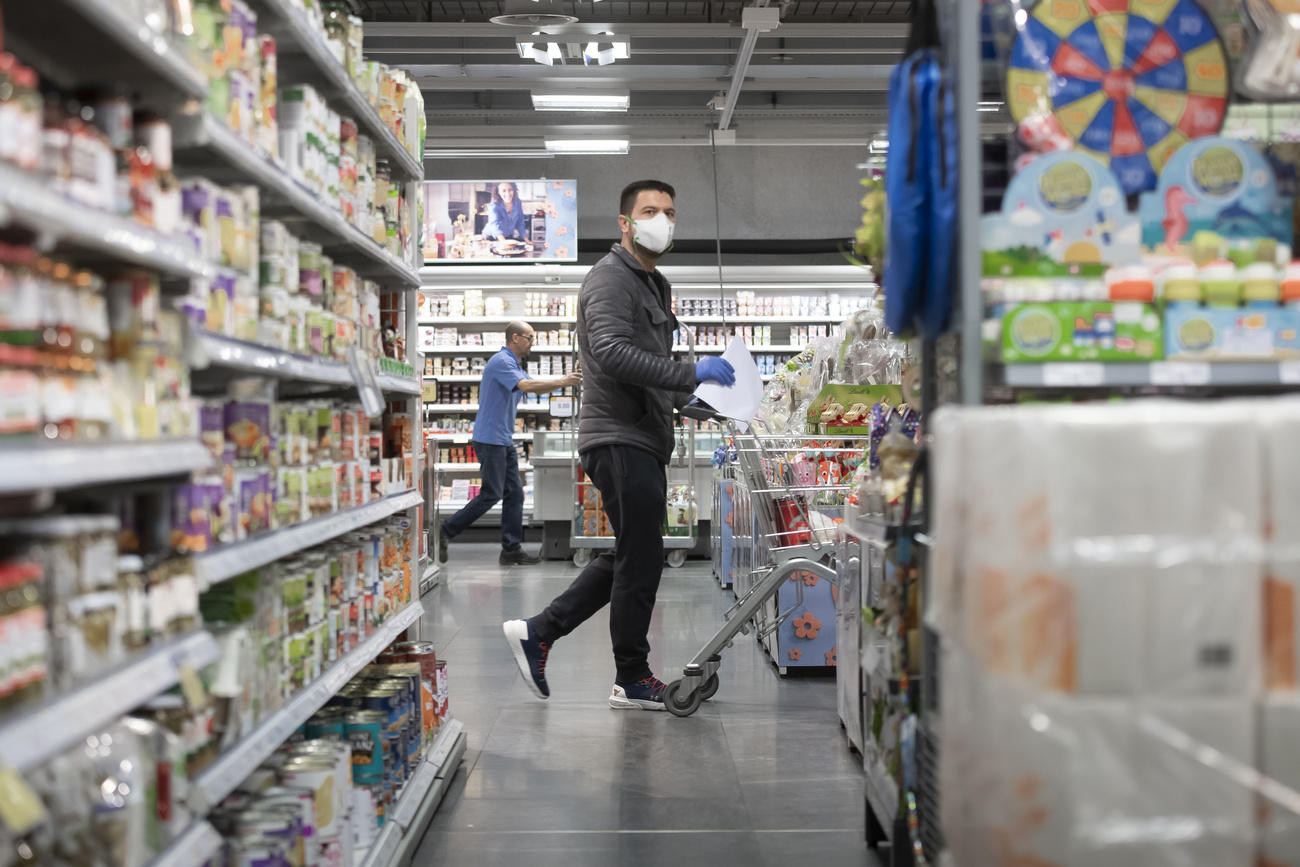
How the Swiss food supply chain is coping with Covid-19

Running out of rice? Low on loo roll? In fact Switzerland has enough to last for months, but stockists are putting in serious overtime to meet the demand.
Like their peers in other parts of the world, shoppers in Switzerland began panic-buying in response to the threat of coronavirus. Images of empty shelves made the rounds on social media, with popular items selling out more quickly than the shops could replenish them – replenish being the key word.
“There is no reason to panic over food,” the government’s delegate for national economic supply, Werner Meier, told journalists last week. The Swiss Retail FederationExternal link took out a full-page newspaper ad assuring the public that there was no shortage of food, drinks, pet supplies or other necessities. It called on shoppers to be sensible: “Those who buy more than necessary may be leaving others empty-handed and our staff overworked – at a time that is already very challenging.”
Double the pallet loads
So how are workers in retail coping with the extra demands of people who are now at home for every meal – some of them wary of extra trips to the grocery store or worried about self-quarantine?
At its main distribution warehouse, major supermarket chain Migros has added five extra shifts per week and is moving 10,000 pallets of wares on its busiest days; 5,500 would be the norm.
“The customers [were] practically unpacking the trucks for us. I’ve never experienced anything like it,” logistics manager Thomas Gasser told the weekly Migros customer magazine. “We have enough food – that wasn’t the problem.”
To compensate for the increase in demand, the central warehouse has been sending the stores at least a third more wares than they actually order to ward off bare shelves. Pasta, for example, needs to be restocked two to four times as often as usual.
Retailers aren’t the only ones with ample supplies. Switzerland maintains emergency stockpiles of staples like flour, rice, sugar and oil. According to the Economic Supply Act, the nation must have enough to last for three to six months in the event of a crisis.
Shipments still coming in
Switzerland produces about 60% of the food it needs to feed its population of 8.5 million. The rest is imported – for example, Italy and Spain are key partners for fruits and vegetables.
The supply chain here is still intact, according to Marcel Jampen of SwisscofelExternal link, the association for the Swiss fruit, vegetable and potato trade.
“There are in some cases too few trucks or longer waiting times to cross the Swiss border. And there are some shortages in terms of harvest workers,” said Jampen, who is the head of Swisscofel’s international fruit and vegetable department.
“Despite the coronavirus crisis, domestic production and the import of everyday goods are secured,” states the Federal Office for National Economic SupplyExternal link on its website. It points out that thanks to the current reduction of imports from Asia, there’s more logistical capacity at European ports and for the onward delivery to Switzerland.
“Cross-border train traffic is currently operating without any issue. For road traffic, there are lines at some border crossings,” notes the office.
Nights and Sundays
To make it easier for retailers to cope with the increased demand for essential goods, the supply office and the Federal Roads Office have temporarily relaxed the regulations on Sunday and night-time trucking and (un)loading.
But some workers in the industry don’t feel so relaxed.
“I get an uneasy feeling when drivers from Italy pick up or drop off goods. There are a lot of coronavirus cases there. I always keep a distance,” said Ali Cekcu, a forklift operator working for Migros.
Can the virus be transmitted via food?
“So far there are no known cases of the new coronavirus being transmitted via foodstuffs,” states the Federal Office of Public HealthExternal link on its website. “If you want to be quite sure, wash and heat foods properly.”
The threat of Covid-19 has forced the temporary halt of services such as soup kitchens and some food pantries.
Still open are the Caritas supermarkets, which offer low-price groceries to people living under the poverty line.
“Turnover has doubled. People are buying more, despite their small budgets,” said Caritas SwitzerlandExternal link spokesman Stefan Gribi, noting that there was plenty of food but the challenge was distributing it evenly around the country. He noted an increase in volunteers and donations.
“Many businesses are helping right now,” confirmed Caritas supermarket head Thomas Künzler. “Kimberly-Clark donated two truckloads of toilet paper. Farmers are offering us lots of free vegetables. And a pharmacy is selling us its homemade hand sanitizer at cost.”
In addition to its usual customers, who need a card confirming their eligibility for the reduced-price wares, Caritas markets are accepting the clients of Tischlein Deck DichExternal link, a non-profit that distributes surplus food but has temporarily suspended its operations.
You can contact the author of this article on Twitter: @SMisickaExternal link

More
Coronavirus: the situation in Switzerland

In compliance with the JTI standards
More: SWI swissinfo.ch certified by the Journalism Trust Initiative


























You can find an overview of ongoing debates with our journalists here . Please join us!
If you want to start a conversation about a topic raised in this article or want to report factual errors, email us at english@swissinfo.ch.